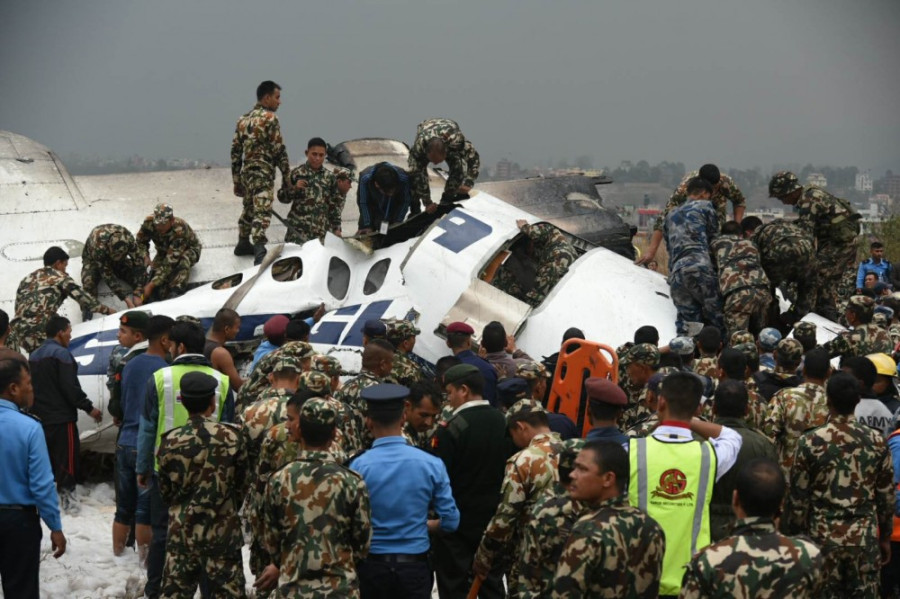National
Mental health history of airline pilots in the spotlight after fatal US-Bangla crash, report says
The 43-page report submitted to Tourism Minister Rabindra Adhikari on Sunday recommended that before the renewal of licence of any permanently grounded pilot due to a medical reason, a thorough periodic physical and psychological status should be assessed.
Sangam Prasain
Nepali investigators have cast a spotlight on the history of mental health of pilots in the final report on the crash of the US-Bangla plane at Kathmandu’s Tribhuvan International Airport last year, killing 51 people.
The 43-page report submitted to Tourism Minister Rabindra Adhikari on Sunday recommended that before the renewal of licence of any permanently grounded pilot due to a medical reason, a thorough periodic physical and psychological status should be assessed.
A system should be adopted so as to monitor the medical condition closely in all subsequent medical examinations as well, the report said. The investigation commission has recommended that all airline pilots undergo a psychological evaluation as part of the training or before entering into service.
The final report has made minor revisions to the version of the report that was obtained by the Post last year. In a detailed story, the Post had reported that the flight’s captain, Abid Sultan, had been released from Bangladesh Air Force in 1993 because of depression and that Nepali investigators wrote his past behavior should have been a warning sign. The report released on Sunday has removed statements like “I don’t f—-k care about safe flight, you f—- your duty”—which Sultan reportedly said at one point inside the cockpit.
[Read: The US-Bangla pilot was mentally stressed and reckless]
According to Buddhi Sagar Lamichhane, member-secretary of the investigation committee, there were no significant changes in the report and they have made some a few changes in the “personal issues” of the flying crew. “We have not been diverted from the original fact,” he told the Post.

As per the available medical records, Sultan was declared fit to fly civilian aircraft by medical assessors after a detailed medical evaluation in 2002. During his routine annual medical evaluation, he was assessed fit for flying and was considered free from any symptoms and signs of depression.
The report said that Sultan’s detail medical history was not reviewed by US-Bangla Airlines when he was hired. Medical examination of the pilot in successive annual medicals was not focused on his previous medical condition of depression, which seemed mandatory, the report said.
“Many pilots refuse to seek treatment for mental health issues because they fear the medical assessment will have a negative impact on their career,” Lamichhane told the Post. “This may have cost the passengers lives as well as the airlines.”
Lamichhane said that the crash has shed light on the need for an extensive study on the medical history of the flying crew.
In 2015, following the crash of a Germanwings flight in the Alps, investigators found that 27-year old pilot Andreas Lubitz suffered from an episode of severe depression during his training and had been excused from work by doctors for an unspecified illness on the day of the crash—facts he appeared to have concealed from the airline. Cockpit voice recordings also suggested that the pilot deliberately crashed the plane into the French Alps, killing all 149 others on board.
The US Federal Aviation Administration requires captains to have a first-class medical certificate renewed every year if the pilot is under 40 years of age and every six months if the pilot is 40 years or older. Psychological checks are not required.
“This crash is not exactly similar to Germanwings but it has thrown a spotlight on the history of mental health [depression] of the pilot,” Lamichhane said. “We have also found that the pilot of Makalu Air that crashed in May last year had some issues related to his mental health.” The final report on the crash of the Makalu Air cargo aircraft that crashed in Humla last year is expected to be completed soon.
The investigators, who took nearly a year to produce the final report, said there was clear evidence that the flight captain was harbouring severe mental stress. “The effect of stress was evident with the fact that he was irritable, tensed, moody, and aggressive at various times,” the report said.
Few minutes before the landing time, Sultan had confirmed that the plane’s landing gear was down and locked. “Gears down, three greens,” the pilot said, according to the report, referring to the electrical indicator lights inside the cockpit.
However, when co-pilot Prithula Rashid conducted a final landing checklist, the landing gears were not down. The report said that the pilot was worried about one particular aspect and was thinking about it all the time. “This was about one particular female colleague’s criticism on his competency. Most of the conversation in the cockpit was directed towards and aimed at the female colleague who apparently was telling others that the pilot was not a good instructor and he could not teach properly.”
Lost in the conversation, the landing was completed in sheer desperation after sighting the runway, at very close proximity and very low altitude, the investigators said in the report. There was no attempt made to carry out a go-around when it seemed possible until the last instant before touchdown on the runway, the report said.
Both pilots were anxiously trying to locate the runway. Both pilots made several statements that reflected that they had completely lost their orientation of the runway, but that was not communicated to the air traffic controller.
As the pilot was smoking continuously inside the cockpit during the one-hour flight from Dhaka to Kathmandu, the report has recommended that airline operators should reinforce firm “No Smoking” policy during flights and have a system in place to monitor it and take actions.




 10.12°C Kathmandu
10.12°C Kathmandu














